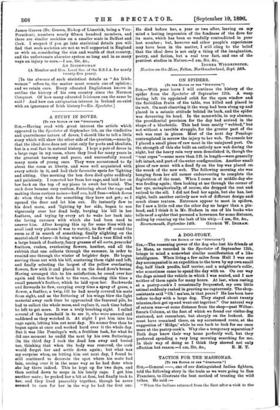A STUDY IN DOVES.
[TO THZ EDITOR OP THE " SPICTATOR:1
SIR,—Having read with great interest the article which appeared in the Spectator of September 5th, on the vindictive and quarrelsome nature of doves, I should like to tell a little story which will show the other side of the question,—namely, that the ideal dove does not exist only for poets and idealists, but is a real fact in natural history. I kept a pair of doves in a large cage in my room, where they lived for many years in the greatest harmony and peace, and successfully reared many nests of young ones. They were accustomed to fly about the room at liberty, and were well acquainted with every article in it, and had their favourite spots for 'lighting and sitting. One morning the hen dove died quite suddenly and painlessly. I removed her from her cage, and laid her on her back on the top of my piano to await her buriaL The cock dove became very restless, fluttering about the cage and making those curious noises—half coo, half fuss—which doves do when they wish for something they have not got; so I opened the door and let him out. He instantly flew to his dead mate, and 'lighting by her side, began to coo vigorously over her dead body, burying his bill in her feathers, and trying by every art to wake her back into the loving caresses with which she had been used to answer him. After keeping this up for some time with no avail (and very piteous it was to watch), he flew off round the room as if in search of something, finally alighting on the mantel-shelf where—it being winter—I had a vase filled with a large bunch of feathery, fancy grasses of all sorts, peacocks' feathers, rushes, everlasting flowers, heather, and all the rubbish that one collects through the summer, in order to remind one through the winter of brighter days. He began sorting these out with his bill, scattering them right and left, and finally selecting the largest of the yellow everlasting flowers, flew with it and placed it on the dead dove's breast. Having arranged this to his satisfaction, he cooed over her again and then flew back to the vase, choosing this time a small peacock's feather, which he laid upon her. Backwards and forwards he flew, carrying every time a spray of grass, a flower, a feather, a twig, till he had nearly covered his mate from sight, and as the fluttering of his wings blew the light material away each time he approached the funereal pile, he had to collect the whole mass, and replace it, each time before he left to get more. It was a truly touching sight. I called several of the household in to see it, who were amazed and saddened as they watched it. At night I put him into his cage again, letting him out next day. No sooner free than be began again at once and worked hard over it the whole day. But it was like Penelope's web, a fruitless task, for what he did one moment he undid the next by his own flutterings. On the third day I took the dead hen away and buried her, thinking that when the body was removed, the cock would forget her and settle down again ; but what was my surprise when, on letting him out next day, I found he still continued to decorate the spot where his mate bad lain, cooing over it in the same way as he had done when she lay there indeed. This he kept up for two days, and then settled down to mope in his lonely cage. I got him another mate; he pecked her a bit at first, but finally took to her, and they lived peaceably together, though he never seemed to care for her in the way he had the first one.
He died before her, a year or two after, leaving on my mind a lasting impression of the fondness of the dove for its mate, which has been so woefully contradicted in your last number ; but, however sad other people's experiences may have been in the matter, I still cling to the belief that the ideal dove is not only a thing of the imagination, poetry, and fiction, but a real true fact, and one of the• prettiest studies in Nature.—I am, Sir, &c.,
IDONEA WIDDRINGTON.
Newton-on-the-Moor, Felton, Northumberland, Sept. 14th.


































 Previous page
Previous page